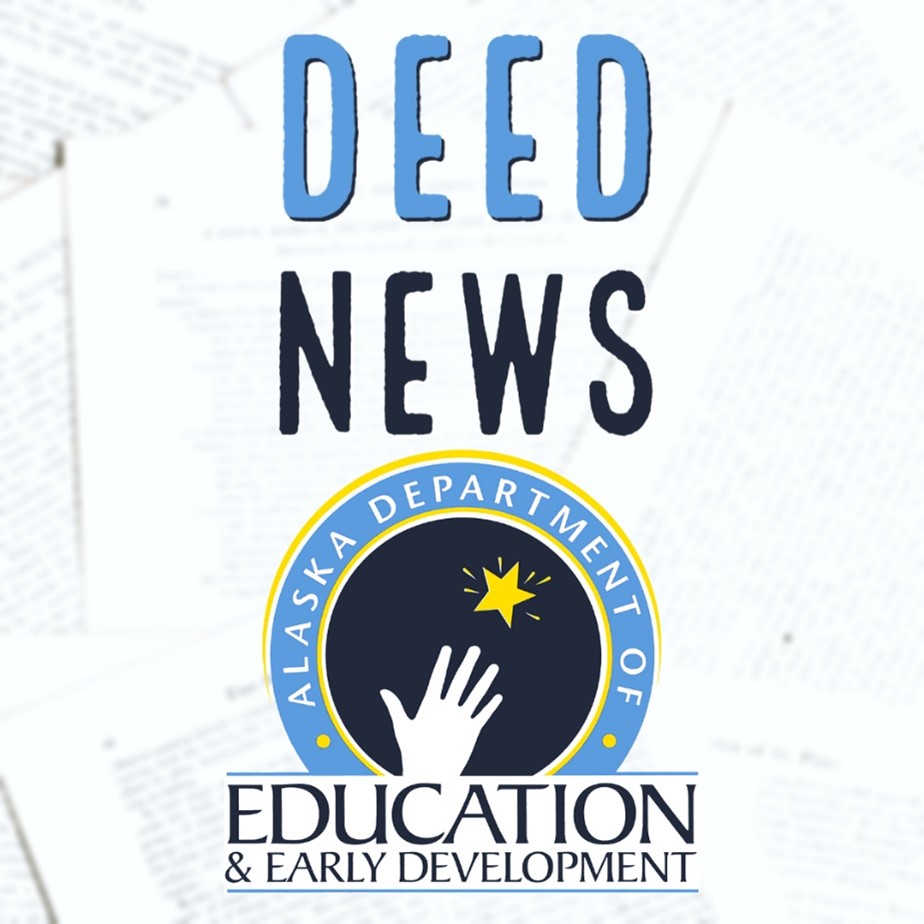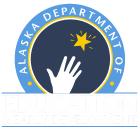- Cama-i, quyana tailuci!
- (Central Yup’ik)
- "Greetings, thank you for coming!"
News from the Alaska Department of Education
Bond Reimbursement and Grant Review Committee Meeting June 27
The Bond Reimbursement and Grant Review Committee will meet via teleconference on Thursday, Monday, June 27, 2022, 1:30 p.m. - 3:30 p.m. The committee's agenda and meeting packet will be available prior to the meeting at education.alaska.gov/Facilities/BRGR.
The primary topics of the meeting is department and subcommittee updates.
Audio Teleconference available through free online Zoom application (click to join).
or Toll Call-in number (US/Canada): 1 (253) 215-8782
Meeting ID: 894 3599 6912
Individuals or groups with disabilities who require specific accommodations in order to participate should contact Lori Weed at 907-465-2785 or lori.weed@alaska.gov by noon on Wednesday, June 22 so arrangements can be made.
SLED Passwords Changing on June 27
As a direct result of SLED credentials being posted on public web pages, we are changing the SLED (https://sled.alaska.edu) password on June 27, 2022. If you work in a library, school, archives or museum and would like the new password BEFORE the change, please send an e-mail to daniel.cornwall@alaska.gov (preferably from your work e-mail) with the following:
Name:
Institution:
Position:
Email:
Daniel will email you the NEW credentials, which will work starting 6/27/2022 at https://sled.alaska.edu. Later this week, credentials will be mailed directly to public library directors as identified through the most recent Public Library Report.
Starting 6/27/2022, you will be able to request the new credentials in two ways:
- If your phone number has a 907 area code, you may call 1-800-440-2919 and hear the id and the new password.
- Request the password from The SLED help page
If you have an Alaska-based Internet Service Provider, you may not be asked for a username/password.
SERRC Hiring Empowerment Specialist
The Empowerment Specialist is a grant-funded, contractor position designed to support the intensive needs of a Comprehensive Support and Improvement School (CSI). This position will collaborate and work closely with the Region 16 Comprehensive Center (R16CC) and the School Recognition and Support Team at the Department of Education and Early Development (DEED) to support District leadership, school site leadership and teachers, and its community members. The Empowerment Specialist is the liaison between all key
stakeholders and helps strengthen already established relationships and perhaps build new relationships between DEED, the school, and its community. The Empowerment Specialist will utilize the Four Domains for Rapid School Improvement to improve teacher practices that will increase student academic achievement.
This contracted, non-benefit position is through June 30, 2023 with possibility for contract renewal annually. Expected part-time position average is 40 hours/month and full-time positions may be considered. A travel stipend is accessible. The anticipated start date is July 1, 2022. For questions contact Julie Staley at julies@serrc.org.
New and Revised Facilities Publications Available
The Department of Education and Early Development, Facilities section has recently released the following new and revised publications, which are available through the Facilities’ Publications and Resources page.
- Alaska School Design and Construction Standards (1st Edition; April 2022). This publication provides cost-effective construction standards for consistency in administering state aid through debt reimbursement and grants under AS 14.11 for construction, rehabilitation, and improvement of schools and education-related facilities.
- Capital Project Administration Handbook (3rd Edition; April 2022). This publication provides guidance on the department’s requirements for capital improvement project administration to ensure that the implementation of the project complies with school construction statutes and the regulations.
- Program Demand Cost Model (21st Edition; May 2022) and instructions. The Cost Model can be used to develop concept-level estimates for new construction or renovation projects.
The Department of Education and Early Development has released the FY2024 Capital Improvement Project (CIP) application and support materials, as approved by the Bond Reimbursement and Grant Review Committee. The CIP materials and other publications and resources to support school district capital projects are available on the Facilities’ CIP Application and Support page. Applications for FY2024 CIP grant funding must be postmarked by September 1, 2022.
DHSS & DEED Seek Principal and Health Teacher Feedback
Every two years the Department of Health and Social Services and the Department of Education and Early Development unite in an effort to survey secondary principals and health teachers about their needs around supporting health curriculum, policies and professional development. The results help in planning ongoing training opportunities as indicated by school health leaders across the state. Principals and health teachers will be receiving email requests for input via an online survey. Thank you to the 90 plus principals who have responded - we are over half way to our goal of having statistically valid data. We need Principals to also send us contact information for one teaching health in their school. If you have questions or health teacher contact please send to hss.dph.chronic.profiles@alaska.gov. We need your voice!
DEED Final FY23 Capital Improvement Project Grant Rankings Available
DEED’s final FY2023 priority lists of district-submitted CIP grant applications for school construction and major maintenance projects are now available. Priority lists are used by the department, governor, and legislature to determine school construction and major maintenance projects for capital funding during the upcoming budget cycle.
Alaska K-12 Education COVID-Relief Funding Dashboard Now Available
The Alaska K-12 Education COVID-19 Federal Relief Funding Dashboard includes information on funding for individual districts, DEED, the Office of the Governor, and non-public schools. Information on the dashboard includes award amounts and expenditures, timelines of funding availability, and project descriptions.
In addition to the funding dashboards, DEED created a new webpage for COVID relief funding resources. The COVID Relief Funding Resources page will help both school districts and the public find health resources, funding resources, and considerations for school closures.
DEED adds Understanding Homelessness and Dyslexia eLearning modules
DEED is proud to announce the release of two new eLearning modules- Understanding Homelessness and Dyslexia.
Understanding Homelessness (30 minutes)
This course helps educators learn how to identify children and youth who meet the definition of homeless, the services available to help students and families, and understand the educational rights of students experiencing homelessness. For information about the McKinney-Vento Homeless Assistance Act, please contact Cecilia Miller at Cecilia.miller@alaska.gov.
Dyslexia (45 minutes)
In this course you will have the opportunity to build on your understanding of the specific learning disability, dyslexia. This course identifies effective, evidence-based strategies for reading, outlines reading instruction essentials, and provides ideas for classroom supports to implement with students with dyslexia. For support concerning individuals with disabilities, please contact sped@alaska.gov.
Please visit DEED’s eLearning page to login https://eedelearning.inquisiqlms.com/. Email eLearning@alaska.gov or call (907) 465-8677 for assistance with your account.
Assessment & Data Literacy Training
Alaska’s System of Academic Readiness (AK STAR) gives educators insights that can help improve student learning. Beginning November 30 and continuing into 2022, teachers, teacher leaders, coaches and administrators are invited to join professional learning sessions available for free that will equip educators to make the most of assessments. Workshop and seminars will range from “Basics of MAP Growth” to “Balanced Assessment Systems for Leaders.” A full course catalog is available online. One college credit is available for educators participating in at least six sessions.
DEED adds e-Learning course on teen vaping in Alaska
Did you know almost 50% of Alaska youth have tried e-cigarettes? E-cigarettes (also called “vapes”) are highly addictive, contain toxic materials and harm brain development. Luckily, Alaska educators can make a big difference in helping youth and young adults quit – and prevent them from starting smoking in the first place. A new e-Learning course for educators about e-cigarette use among Alaska teens provides information about health harms, helps identify various types of products, teaches how to prevent use, and shares resources for schools, parents, and teens. Visit https://education.alaska.gov/ELearning to enroll in this course today!
Overcoming Anxiety and Stress in Alaskan Schools
Covid-19 has had a profound effect on all Alaskans. We have seen an increase in anxiety and stress in students, staff and families. In response, DEED created a new eLearning course to help Alaskans navigate and manage stress and anxiety. When we successfully manage these emotions, we can harness their power to be successful. But toxic levels of stress and anxiety can have significant impacts on our well-being. Both teachers and students are susceptible. In this course, you will learn ways to help students manage stress and anxiety—methods you can also use yourself.
After completing this course, you will be able to:
- Explain how stress and anxiety impact students and staff in Alaskan schools
- Use practical tools to help students, colleagues, and yourself manage stress and anxiety
Please visit our eLearning webpage to log in or request a new account: https://education.alaska.gov/ELearning
Alaska State Council on the Arts Adaptation and Innovation Grants
The Alaska State Council on the Arts has Adaptation and Innovation Grants available on a rolling deadline, 30 days prior to the planned activity. Eligible applicants include schools, school partners (such as PTA/PTO organizations), organizations and individuals. The Alaska State Council on the Arts in partnership with Rasmuson Foundation developed the Adaptation and Innovation Grant Program to support efforts to rebuild and advance our work together, to connect with community, and to positively impact Alaskan lives across the state in and through the arts and cultures of our state. For complete information, guidelines, and applications, visit the Alaska State Council on the Arts – Adaptation and Innovation Grants page at https://arts.alaska.gov/adaptation-and-innovation-grant-program.
Alaska Statewide Virtual System Discussion Board
AKSVS teachers, are you looking for a place of discussion and support? Interested in meeting and sharing with other Alaskan teachers using AKSVS? Check out the Teacher Channel Discussion Board through the Alaska Professional Learning Network.
DEED Science Education Listserv
DEED launched a new Science Education Listserv! The listserv will be a space for science teachers in Alaska to share information on teaching practices, instructional resources, community partnerships, lesson plan and unit ideas, professional development opportunities, and to discuss topical concerns in science instruction. DEED will also use it to push out notifications regarding opportunities in science education. All science teachers in Alaska (pre-K, K-12, and collegiate) are encouraged to join.
Many of you know that Alaska has a statewide license to BrainPOP, but did you know that your teachers can unlock additional features through individual accounts that can only be set up at the school level? At no additional charge to you?
- For students to access BrainPop: click the LOG IN tab (not ENTER CODE)
- For teachers to whose schools are set up to use BrainPop Educator: use the ENTER CODE
If you have the username and password for DEED’s statewide subscription, please only share it in a way that no one on the internet besides your patrons or students can access the username/password. (i.e. direct e-mail ok, posting to your social media/website/blog is NOT.) If you don’t have the current SLED database credentials, visit the SLED Password Request form and fill it out completely. Expect a response within one business day. The SLED usernames and passwords are good for nearly all the SLED Databases and resources. One request will empower you to help with just about anything SLED related. Contact Martha Ketsdever, BrainPOP Account Manager for Alaska State Libraries, for more information.

